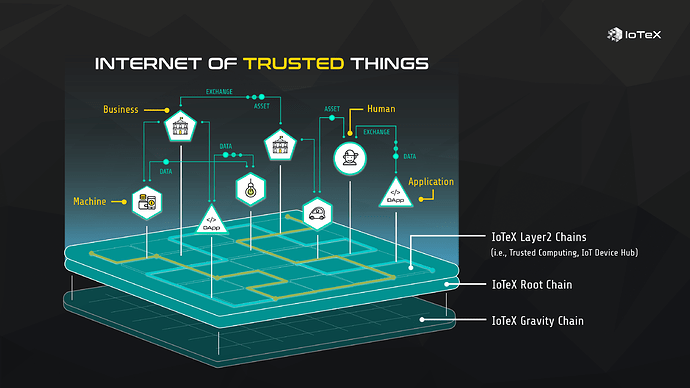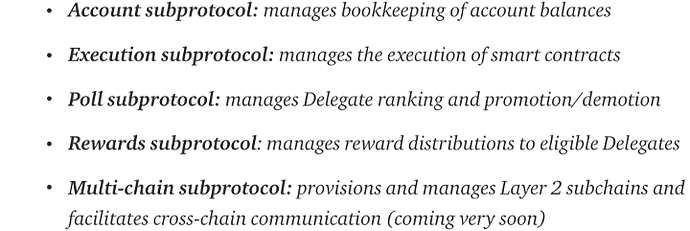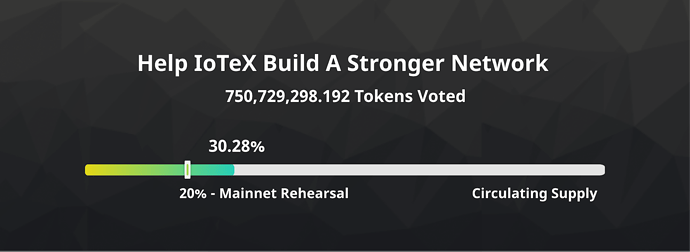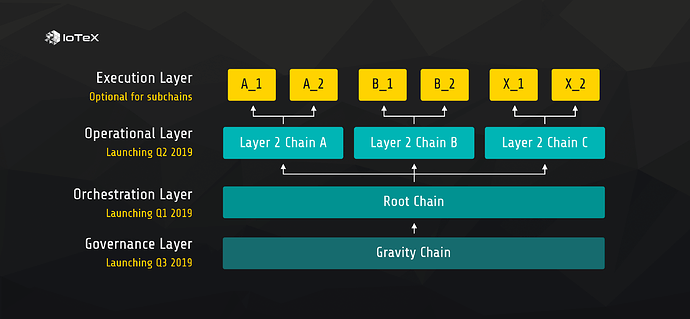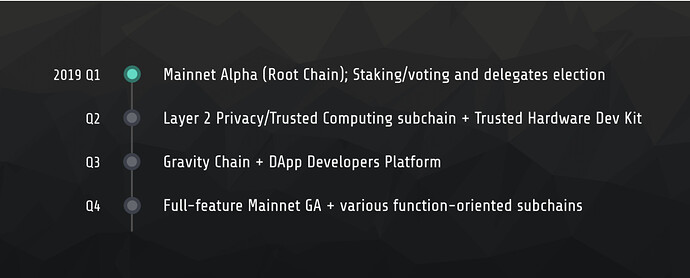IoTeX & Internet of Trusted Things
IoTeX began our journey in 2017 to build the Internet of Trusted Things , where all physical and virtual “things” — humans, machines, businesses, and dApps — can efficiently exchange information and value at global scale. Throughout the past two years, we built IoTeX from scratch and devoted ourselves to delivering new innovations to the blockchain industry. This is manifested in Mainnet Alpha , which delivers a state-of-the-art Root Chain on which new Layer 2 chains, tokens, dApps, and businesses will be launched.
The IoTeX Mainnet serves as the origin for the Internet of Trusted Things. Our vision is much more than just adding trust to today’s IoT devices. Rather, by acting as a decentralized trust fabric for ALL physical and virtual things , IoTeX will drive end-to-end trust throughout the entire information life cycle, including collection, transport, storage, and utilization. This means data and assets can be shared by all types of “things”, enabling new decentralized business models involving humans, machines, businesses, and dApps:
- Humans can seamlessly transact with machines in new sharing economy and data-as-a-service use cases
- Machines can interact directly with other machines to power decentralized autonomous organizations (DAO)
- Businesses can collaborate with other businesses to achieve new levels of collective intelligence and impact
- Humans, machines, and businesses can access trusted dApps to perform various processes/tasks with full data privacy
The Internet of Trusted Things will change the world; however, it takes a special kind of blockchain to bring this vision to reality. IoTeX is the only blockchain platform capable of powering the Internet of Trusted Things. From Day 1, we made upfront design decisions to tailor fit IoTeX to support data privacy, trusted computing, large-scale IoT, interoperability, and big data use cases. By serving as the infrastructure to unify all “things”, IoTeX will power the new decentralized economy.
What is Mainnet Alpha?
Mainnet Alpha introduces the Root Chain, which is a robust foundation for future Layer 2 (L2) chains and dApps . As the manager of all L2 chains, the Root Chain utilizes Roll-DPoS consensus to guarantee security, reliability and transparency. The Root Chain provides P2P networking and consensus resources, which are leveraged by all L2 chains in the IoTeX Network. The Root Chain will allow developers to spin up custom L2 chains just as they would a new instance on Cloud! Cross-chain communication is also enabled by the Root Chain, which allows L2 chains to interoperate.
The safety-oriented Root Chain acts as a launchpad for various L2 chains, which are meant to be flexible and fit-for-purpose. L2 chains can be created with distinct crypto-economics and architectures to satisfy specific use cases: permissioned vs. permission-less, storage vs. micro-transaction focused, privacy vs. transparency-centric . The first L2 chain ( codename: “AvoChain” ) focused on privacy and trusted computing will be launched in Q2 2019.
Key components that have been released in Mainnet Alpha include:
-
Roll-DPoS Consensus : IoTeX’s in-house consensus mechanism is a variant of Delegated Proof of Stake (DPoS), which delivers higher scalability without sacrificing decentralization or security . Roll-DPoS randomly selects 24 of the top 36 community-elected Delegates using distributed key generation (DKG) + BLS signatures. New Delegates are randomly selected every epoch (one hour) to ensure high security and hardware efficiency.
-
Ethereum-to-IoTeX Bridge : until the IoTeX Gravity Chain (governance layer) is launched in Q3/Q4, governance tasks (e.g., staking/voting) will be run on Ethereum. To facilitate this cross-network interoperability, we built a first-of-its-kind decentralized bridge between IoTeX and Ethereum, where the status of Ethereum staking/voting smart contracts instruct the IoTeX blockchain to perform Delegate swaps based on live voting results.
-
Extensible State transitions : IoTeX’s state transition component is designed to be extensible, meaning a subprotocol can be conveniently plugged in to support certain state transitions (e.g., confidential txns) without disrupting performance/security. As of now, there are five subprotocols implemented in Mainnet Alpha:
-
EVM-compatible execution unit: Mainnet Alpha uses Ethereum Virtual Machine (EVM), which is widely used by blockchain developers. Existing EVM-based dApps can be ported over to the IoTeX Network starting now! In the future, we will use EVM as a standalone execution unit for edge devices and develop an in-house IoTeX Virtual Machine, interpreter, and corresponding programming paradigms for decentralized computing.
-
SDK and explorer : to ensure a great developer experience, we provide the latest tech stack in the industry. dApps can interact with the IoTeX blockchain using our SDK (iotex-antenna) via gRPC. Developers can also create/unlock accounts, prepare smart contracts, and query the chain with GraphQL via our explorer (iotexscan). We use typescript to support type check and type annotation for ease of use and engineering quality.
IoTeX Native Token & Utility
The launch of Mainnet Alpha also marks the official launch of the IoTeX native token . The IoTeX native token is a utility token, which will be used in both the Root Chain (orchestration layer) and Gravity Chain (governance layer) for the following purposes:
- Decentralized governance: staking/voting for Delegates, Delegate rewards and slashing, and network-wide votes/referendums (i.e., changes to rules, parameters, protocols)
- Gas fees: running transactions and executing smart contracts on the IoTeX Network. One novelty is that gas fees are collected as a “tax” and then pooled/distributed to block producing Delegates
- Bond/operation costs for L2 chains : to provision a Layer 2 chain, one must stake tokens on the Root Chain as bond and pay for operational costs. Each L2 chain may have its own crypto-economics and tokens, but will pay “registration costs” to leverage Root Chain resources.
Token Swap: Native & ERC20
The new IoTeX native token and existing IoTeX ERC20 token will co-exist for 3–6 months (until Gravity Chain launch in Q3/Q4 2019). For now, the ERC20 token will be used for staking/voting on Ethereum and will be tradable on exchanges (i.e., Binance, Bittrex, Upbit), while the native token will be used for running transactions and smart contracts on the IoTeX Network.
After the launch of Gravity Chain in Q3/Q4 2019, we will facilitate an official ERC20-to-native token swap via mainstream exchanges. Until then, options for token holders to two-way swap their tokens 1:1 include:
- ERC20-to-native: leverage our Ethereum-IoTeX bridge to swap via smart contract — just send ERC20 tokens to an Ethereum smart contract and the corresponding amount of native tokens will be sent to your IoTeX address
- Native-to-ERC20: use our micro-service iotex-tube — just send your native tokens to a specific IoTeX address, and corresponding amount of ERC20 tokens will be sent to your ETH address.
IoTeX Delegates & Staking/Voting
The IoTeX Network uses Roll-DPoS consensus , where Delegates are elected by token holders to run consensus on behalf of the entire network. The primary role of a Delegate is to help grow and maintain the network by providing robust node infrastructure, maintaining high server uptime, collaborating with other Delegates to run consensus, and contributing to various network initiatives.
IoTeX uses a unique staking/voting process managed completely by smart contract. As such, there is no centralized entity that can manipulate voting results — it is fully decentralized as all voting should be! In the IoTeX Network, 1 token = 1 vote and voters can also get bonus votes by setting a pre-defined stake duration (bonus curve). For more information on the voting process, please see our all-in-one Voter Handbook .
There are currently 50+ IoTeX Delegates from 20+ countries , including developers, community, media, universities, enterprises, and funds/VCs. Also included are experienced node operators from other PoS/DPoS networks, such as EOS, Tezos, Tron, Lisk, and IOST. With such a diverse, committed, and experience group of Delegates, we are confident that the IoTeX Network will be able to evolve efficiently and sustainably.
Vote today at member.iotex.io !
Voting for Delegates began on March 11, with a goal of having 20% of the total circulating supply (~500 million IOTX) staked/voted to bootstrap the Mainnet. This goal was met within one week , a testament to our highly committed community! With one week left until Mainnet Alpha, there are now > 750 million tokens staked/voted (~30% of the circulating supply). If you haven’t voted yet, vote today on the official voting website!
The Future of IoTeX
IoTeX is and always will be 100% open source — an experiment in mindshare and collaboration, where the whole is greater than the sum of its parts. The launch of Mainnet Alpha represents a new era of IoTeX , with community-driven development and teamwork as top priorities. We can’t wait to see what you will build on the IoTeX Network!
The Grand Design of IoTeX: Multi-layer Architecture
Mainnet Alpha is just a start — the grand design of IoTeX is a multi-layer architecture comprised of hierarchical blockchain layers with unique duties: Gravity Chain (governance), Root Chain (orchestration), and Layer 2 chains (operation/execution) . Additional layers will be released throughout 2019, with the first Layer 2 chain in Q2 and the Gravity Chain in Q3/Q4. For more details, please see our post on The Grand Design of IoTeX .
IoTeX Roadmap 2019
As shown in our roadmap, 2019 will be an action-packed year for IoTeX. With a robust Root Chain foundation in place, the next steps of adding new L2 chains (i.e., trusted computing, IoT device hub), open source tools (i.e., SDKs, explorers, wallets), and dApps/services (i.e., DEX, stable coins, oracles) will involve the entire IoTeX developer and user community . Let us celebrate this major Mainnet Alpha milestone together and look forward to the journey ahead — let’s build the future together!

